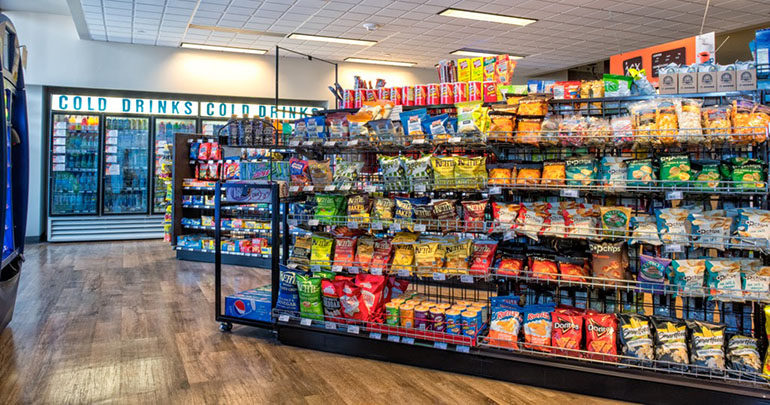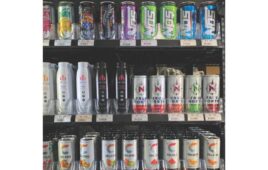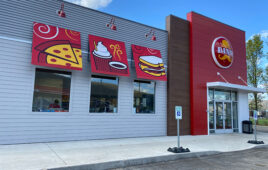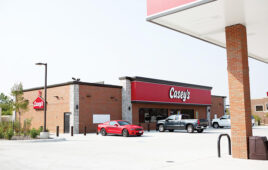 As early as February, Raymond Huff predicted COVID-19 would impact his Russell’s Convenience Stores business. What he didn’t anticipate was a whopping 85% drop in sales when states locked down. The president of Denver-based HJB Convenience Corp., parent company of Russell’s, Huff has spent his career surmounting impossible challenges, but the economic fallout due to the COVID-19 pandemic and state lockdowns might be the biggest obstacle he’s had to overcome as a retail veteran.
As early as February, Raymond Huff predicted COVID-19 would impact his Russell’s Convenience Stores business. What he didn’t anticipate was a whopping 85% drop in sales when states locked down. The president of Denver-based HJB Convenience Corp., parent company of Russell’s, Huff has spent his career surmounting impossible challenges, but the economic fallout due to the COVID-19 pandemic and state lockdowns might be the biggest obstacle he’s had to overcome as a retail veteran.
He’s not alone. Convenience store chains across the country are adapting to a new normal as well as evolving local health and safety rules, while working to roll out new programs like mobile apps, online ordering, curbside pickup and delivery, and so much more, at a rapid-fire pace to keep business on track.
Huff has battled a tough economy before and come out on top. In the aftermath of 9/11, he watched the economy crumble and store sales tank to the tune of 40-60% at Russell’s. At that time, Russell’s was owned by Trans Pacific Stores Ltd. (TPS), which was owned by Quince — a partnership that owned several retail ventures, for which Huff was the vice president of operations. When TPS began to divest the c-stores, Huff, a partial owner in TPS, realized he had the assets to purchase the remaining locations. He acquired Russell’s in 2004, at a time when the chain had a loss of $2.6 million in shrinkage and was hemorrhaging in-store sales. Within a few years, Huff reduced shrink to nearly zero, invested in his employees and sent sales skyrocketing. Today, he operates 19 stores in Denver, Los Angeles, San Francisco and Hawaii, including two micromarts.
Eighteen of the 19 stores are located in office buildings in previously booming downtown metro areas. But this unique model is presenting an unprecedented challenge in the 2020 climate. Now the cities are quiet and the office buildings vacant as employees work from home. Huff doesn’t expect delivery to work in his situation, as most customers live outside the city limits and order from businesses closer to home.

Raymond Huff, president of Denver-based HJB Convenience Corp., dba Russell’s, operates c-stores in now vacant office buildings. He’s appealing to local and federal lawmakers for laws assisting small businesses during the pandemic.
“In March, when they first shut down the economy, I said, ‘I’ve got a payroll to pay. I expected to be able to pay out of sales that were to be coming in today, tomorrow and the next day. Guess what? Those sales are not there anymore,’” Huff explained. Russell’s was approved for a Paycheck Protection Program (PPP) loan in March, but it took time for the funds to arrive.
“I sent a note to every one of my employees who were still working because most of my stores were still open. I said, ‘I can’t afford to pay you. However, I’ve been approved for a PPP loan. It hasn’t been funded. When it does get funded, I will pay you, and then I’ll pay going forward.’ I expected 50% of my employees to quit,” Huff said. He sent a similar letter to his vendors.
“All of my employees stayed, and every one of my major vendors stayed, aside from the big boys. That’s how we were able to operate with no money coming in,” he explained.
Luckily, the PPP loan arrived, allowing Huff to make good on all payments. If there’s one thing Huff has learned in the course of his career, it’s that building relationships and treating people right is the only way to succeed long-term. The fact that his employees and vendors stuck with him in the spring, he said, is a testament to that.
Then, just when Huff got his head above water, new challenges arose. June brought protests following the killing of George Floyd by Minneapolis police.
“All my stores are downtown,” Huff said. “The protesters are downtown. There’s no office worker that wants to go near that.” As of early July, the buildings where Russell’s operates were still boarded up. “Not because protesters broke the windows, but because (the city of Denver) thought they were going to break the windows.”
Stores remain open because they are essential businesses, but some are bringing in only $25 a day in sales. “I open a store, and I take care of the one or two customers that we have. We close the store at 1 p.m. It’s ridiculous,” he said. He has subsequently closed four underperforming stores temporarily until tenants return to the buildings.

Russell’s convenience stores are facing trying business conditions as they operate in office buildings that are vacant due to the pandemic and boarded up as a precaution amid ongoing civil rights protests. Four stores have closed temporarily until tenants return to the buildings.
And now, the PPP money is running out, but Huff isn’t going down without a fight. He’s been working with lawmakers at the local and federal levels. At press time, he saw the Reviving the Economy Sustainably Towards a Recovery in Twenty-twenty (RESTART) Act, as his best shot at recovery.
U.S. Sens. Michael Bennet, D-Colo., and Todd Young, R-Ind., introduced RESTART to support the small- and mid-sized businesses affected by the COVID-19 crisis. It would give business owners who took out PPP loans the flexibility to use the PPP effectively, extend the program for the remainder of 2020 and provide loan forgiveness.
At press time, Huff was also monitoring the progress of the federal bill HR6506, which would amend the Small Business Act (SBA), extending PPP and loan deferments and expanding loan forgiveness.
“I trust Congressmen Ed Perlmutter, D-Colo., U.S. Sen. Cory Gardner, R-Colo., and U.S. Sen. Michael Bennet, D-Colo., because it’s not just me, it’s every businessperson like me,” Huff said. “Everybody is hurting. They have got to do something.”
“Unfortunately, these may pass too late to save my company,” he added. “Without help, I will be out of business. I’ll take a huge loss.”
He’s seen several businesses in various industries fail recently because, even with PPP loans, there’s no business as rising unemployment affects demand.
The U.S. Bureau of Labor Statistics reported July 2 that in April and March combined, employment fell by a total of 22.2 million. June looked better compared to the spring with unemployment recovering by 2.2 percentage points to 11.1%, with the number of unemployed persons declining to 17.8 million. While employment recovered a bit in June, since February, the jobless rate has increased by 7.6 percentage points.
The Consumer Economic Sentiment Roller Coaster
The HPS-CivicScience Economic Sentiment Index (ESI) “living” index measures U.S. consumers’ economic outlook. At last reading on July 7, 2020, optimism had declined 1.6 points over the previous week to 46.2. The four-week dip followed a big spike in confidence at the start of June as the economy began to reopen.

Source: CivicScience, 2020; https://civicscience.com/economic-sentiment- continues-to-tumble-as-the-virus-spreads-and-states-reimpose-restrictions/
Doubling Down on Food
Huff faces a particularly challenging situation given that his stores operate in now empty office buildings. For many c-stores, including The Hub, based in North Dakota, the outlook is sunnier, but retailers are still pivoting to recoup lost sales.
“We have faced a double headwind in the past few months. First, the COVID-19 shutdown caused a drop in our business of about 35%,”said Jared Scheeler, CEO of The Hub Convenience Stores Inc., with six sites in North Dakota.
Then came the economic downturn in the oil drilling and production industry due to the pandemic.
“Whereas most of the rest of the world likes lower retail prices at the pump, fuel retailers in North Dakota do not,” Scheeler said. “With so many oil field workers in the area, lower barrel prices mean layoffs and shutdowns. So, amid the coronavirus pandemic, we also have been dealing with a pause in new oil drilling. The layoffs and furloughs have been massive in western North Dakota.”
The rise in unemployment in the area has impacted business.
“We made a strategic decision early that we were going to try to maintain existing payroll as much as possible, so our team members would be less affected,” Scheeler said. “We did see historically high fuel margins for three to four weeks that helped offset the loss in business, but the margins in our area settled down much faster than the rest of the country. In fact, our margins right now are below average.”

McIntosh Energy, which operates four Mac Food Mart stores in Fort Wayne, Ind., fared well overall this quarter. While inside sales dipped and fuel volumes dropped as COVID-19 arrived, the chain had rebounded by July. Now, President Ray McIntosh is preparing for what’s ahead.
Early on in the shutdown, The Hub added delivery service to boost sales. “We handled all of the delivery internally and offered delivery on any basket of $20 or more,” he said.
By mid-June, the company had recouped 2019 numbers. “North Dakota is a sparsely populated area, and while we are by no means averse to COVID-19, it hasn’t been as big of an issue for us as in other areas of the country,” he said.
Still, The Hub’s morning bakery business was hit hard by the shutdown.
“We packaged all of our fresh product; however, we found that extremely restrictive to sales,” Scheeler said. “At the end of June, we reverted back to our standard bakery merchandising practices, and that business is finally coming back.”
The Hub is now enhancing its foodservice offerings to solidify its spot as a food destination. “We’ve made our mark as a foodservice operator, and we believe the way to stay ahead of economic headwinds is to double down in that arena,” Scheeler said.
Scheeler is cautiously optimistic about the future. “However, if we see a fall resurgence with the virus, we may be facing permanent reinvention of our industry,” he said. “As a forward-thinking operator, I’m preparing for all of the above.”
Summer Rebounds Out East
Meanwhile on the East Coast, “April and May were a struggle,” said Doug Galli, vice president and general manager for Reid Stores and Crosby’s, which operate 82 c-stores in western New York and Pennsylvania. In-store sales were down 30-40% with gallons dropping 50% compared to the prior year.
The chain adjusted store hours and reduced employee hours where needed to adapt to dwindling morning traffic. But by the third week of May, sales began to improve.
“We’re still not to last year’s gallons, but we are below single digits now,” Galli said. “We had an incredible June.”
The first week of July brought an all-time in-store sales record for Crosby’s as customers flocked outside after lockdowns expired.

After a tough spring in New York and Pennsylvania, Crosby’s saw an all-time in-store sales record in July as customers emerged from lockdowns. Like many c-stores, Crosby’s has been proactive about safety precautions to keep employees safe amid the pandemic.
At press time, New York was in “phase four” of its reopening response, with many employees still working from home, and the chain hadn’t yet reclaimed 100% of its morning business or returned to normal hours.
To adapt, Crosby’s has been testing curbside pickup and is now rolling out a loyalty program that had originally been planned for April. It’s also adding a new online ordering option for foodservice and select store items to adapt to changing shopping patterns during the pandemic. At select stores, third-party deliveries will also be available.
The chain’s biggest challenge has been finding employees to fill open positions, which Galli attributes to the extra unemployment benefits available. “We’re struggling to keep stores staffed right now, which in the midst of this increased volume has been a bit of a challenge,” he said.
High unemployment doesn’t tend to negatively impact Crosby’s stores. In fact, stores are seeing a huge increase in EBT (Electronic Benefit Transfer) transactions compared to last year. “The government has flooded the market a bit more with people on the Supplemental Nutrition Assistance Program (SNAP), and we’re seeing a huge increase there,” Galli said.
Galli expects summer sales to be strong.

Taken at the start of the pandemic, this image shows Crosby’s employees donning face shields provided by the company to keep them safe.
“We feel pretty good about how we came out of this,” he said. “There were some gasoline margins there that helped us, and we came out of it, for a company of our size, in good shape. For the rest of our fiscal year, which ends the end of October, we’re comfortable with where we’re going to be. If this virus rears its ugly head again in the fall and winter months, it’s a whole new ballgame again. Although we’ll be prepared on how to handle it because we’ve already put everything in place.”
Restructuring for Success
Meanwhile, at the height of spring lockdowns in April, TravelCenters of America (TA) furloughed 2,900 field employees and 122 corporate employees as it was forced to close its full-service restaurants due to COVID-19. TA, Petro Stopping Centers and TA Express travel centers remained open.
Since that time, TA has been able to bring back some of those employees at sites around the country as well as at the corporate headquarters in Westlake, Ohio, as regions reopened and demand increased, according to Jon Pertchik, CEO of TravelCenters of America, which operates 260 locations in 44 states and Canada. “Our moves are based on demand and remain fluid as a result,” he said.
“We are exploring with NATSO (the National Association of Truck Stop Owners) the possibility of future SBA paycheck protection program opportunities for our closed restaurants,” Pertchik added. “We also support legislative protection from liability.”
To help position itself for success amid the tough business climate, in May, TA began a companywide reorganization, which included leadership changes such as the addition of Senior Vice President of Hospitality Kevin Kelly, who will oversee a hospitality department under which restaurants, gaming and convenience stores will be consolidated.
“I believe there are symbiotic opportunities in coordinating between the c-stores and all restaurants as compared to our historically siloed approach,” Pertchik said. “The new structure ensures coordination and collaboration among the business units to better serve and meet the customer’s needs as one organization.”
The chain is also focused on improving its availability to use data and analytics to drive merchandising decisions about SKU rationalization and space allocation, Pertchik said. “Historically, we haven’t focused on data to drive our decision-making, and that will change under the new leadership,” Pertchik said.
The move should help the chain optimize efficiency during a challenging economic landscape.

In Chicagoland, The PRIDE Stores turned to takeout and delivery to keep food sales afloat during COVID-19. At press time the chain was again allowed to offer limited indoor seating, but CEO Mario Spina has his eye on fall headwinds.
Looking Forward
In the Midwest, fuel sales were picking up in the Chicagoland area in July, after the city reopened following lockdowns that began in March.
“We are still significantly down from previous years, but not as vast as a few months ago when we lost over 50% of our fuel sales when stay at home orders were put into effect,” said Mario Spina, owner and CEO of Warrenville, Ill.-based The PRIDE Stores, which operates 15 stores in the Chicagoland area. The chain is set to open its 16th location in Dyer, Ind., which will mark its first location outside of Illinois.
“Our main focus through this epidemic was to take advantage of this time to concentrate on our operations, specifically back-of-house, to ensure we are running our business as efficiently as possible,” Spina said. The PRIDE Stores has been analyzing every aspect of its offering, while putting more weight behind marketing and advertising. When the pandemic hit and restaurant seating closed, PRIDE used social media to heavily promote its takeout and delivery options via Uber Eats.
“We might not be able to control the current environment around us, but we can control how well we operate our stores,” Spina said.

The effort paid off and allowed the chain’s Urban Counter and Taco Urbano restaurants to remain open for takeout and delivery. Food sales, he added, are increasing, but not to pre-pandemic levels. Still, PRIDE’s inside sales have been flat with last year despite the lockdown.
“Certain categories are down, but others are up, significantly up, like beer, wine and spirits,” Spina said. Its outdoor seating proved a major benefit, and at press time, stores were allowed to offer limited indoor seating and the taproom of its 93 Octane brewery had reopened as Illinois’ lockdown entered “phase 4.”
Looking to the fall, “One concern is a shutdown of the economy again,” Spina said. “Another concern we have is competition being too aggressive to see fuel volume return to normal levels, flipping fuel margins into the negative.”
Spina is also concerned about how customers’ economic situations will impact their spending power. “The less disposable income people have, the less funds they have available to make purchases. We are hopeful the economy will come back strong once business are allowed to fully open again.”
In Indiana, Ray McIntosh, president of McIntosh Energy, which operates four Mac Food Mart stores in Fort Wayne, Ind., made it through the spring unscathed, but he’s got his eye on the fall.
“Overall, our chain has fared well,” McIntosh said. Nonetheless, Mac Food Mart saw inside sales decline and fuel volumes drop amid the pandemic.
“But we had margin gains and higher volume of diesel fuel, which offset the decrease in gasoline gallon sales,” he said.
And by July, those inside sales and fuel volumes were rebounding nicely. “I would say we are close to 95% back to pre-COVID business activity.”
McIntosh is taking the time now to reinvest in the stores to keep them as fresh and modern as possible, while upgrading technology.

In Florida, Tom Thumb Food Stores is selling masks and other pandemic necessities, which has offset lost sales in other areas.
“We use backroom software for our day-to-day accounting functions, but now we are using another software firm that provides us with our dollars and units sold by day, week and month to date compared to last year’s sales,” he said. McIntosh plans to use the data to increase units sold and margins with goal-directed results to incentivize employees.
Going forward, he’s evaluating ways to maintain and grow sales volume and see better margins in-store and at the pump, even with a potential drop in in-store visits.
“So far there has been nothing coming from the state or local government (to assist) our type of retailing,” McIntosh said. “I am optimistic going forward, depending on how things turn out during the election this fall. That could change my overall view of our business potential.”
Riding the Surge
When the pandemic began, the Florida Keys — where seven of Tom Thumb Food Stores’ 14 Florida-based sites reside — shut down, causing a drop in sales for the c-store chain. Since the area reopened on June 1, business is rebounding.
“It’s not great and it’s not terrible,” said Richard Klyczek, chief strategy officer for Tom Thumb. “Our inside store sales are actually doing well, versus prior year, but our gallons are still lagging behind prior year.”
The harsher restrictions on other industries like bars and restaurants are benefiting c-stores. “There’s no place for people to be out socially, drinking and smoking, so people are doing that from home,” he said. “So our beer category is performing really well. Cigarettes have been trending well.”
At press time, COVID-19 cases had skyrocketed in Florida to more than 325,000 cases. Tom Thumb operates in one of the hardest hit areas — Miami-Dade. It also operates stores in Broward and Monroe counties. The situation is different in each location.

In Florida, Tom Thumb Food Stores, like many c-stores, has been proactive in keeping customers and employees safe during the pandemic with masks, plexiglass, floor decals to encourage six-foot spacing and hand santizer.
“Monroe has been a little more flexible,” Klyczek said. “They’ve allowed us to get back to self-service food and beverage. We still are unable to do that in Miami-Dade and in Broward, which is presenting a challenge. Our prepared foods, roller grill, dispensed beverage and coffee are still lagging behind prior year, which is challenging.”
Tom Thumb is selling high-demand items like hand sanitizer and N95 and surgical masks, which has made up for lost sales in other areas. “In-store merchandise sales are actually trending in the right direction versus last year,” he said.
Tom Thumb, like many retailers, worked to keep employees and customers safe with masks, hand sanitizer, plexiglass shields, gloves, face shields and social distancing decals.
“We took an aggressive stance to protect our employees, and those measures are still in place,” Klyczek said. “We anticipate masks, gloves and all the things we have in place today will continue at least until the end of the year, unless something significantly changes.”
Looking forward, Klyczek is concerned about the significant increase in COVID-19 cases in Florida.
“One of our concerns is that we take a step backward and get back into home confinement,” he said. “If that were the case, I would expect that that will continue to have a devastating impact on our ability to remain profitable.”
“Now, if I look further out, if unemployment continues on the same path, of course we’re concerned it will eventually have a detrimental impact,” he said. “I think we’ll start getting into those concerns, where customers are economically maybe more impacted, in the next few months.”




